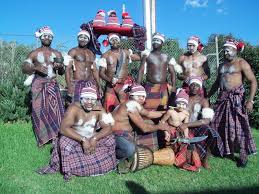After chewing the oji, they gave the King ite ano (four earthen pots) and directed him to keep the pots in front of the Nri Menri shrine outside the obu (palace) with each pots facing the sun. Eke, who was the spokesman of the visiting wise strangers, told Eze Nrijiofor I that the first pot was owned by him, Eke, the second one by Oye, the third by Afor and the last by Nkwo. He told the Eze that the four pots were sent down from Chukwu (God Almighty.) He instructed Eze Nrijiofor I that he and his people whom he ruled should be observing those names daily as market days, during which they should be buying and selling. These market days are used in Igboland to count Izu (Igbo native week). Therefore, Eke, Oye, Afor and Nkwo (four market days) make one Izu (week) in Igbo calendar.

History Of The Four Market Days In Igbo Land And How It Started.
Reading Time: 2 minutes
Editor
Market days in Igbo land are very significant so much so that the four market days I mentioned above are uniformly observed within every community in Igbo land. It was during the reign of Eze Nrijiofor I (1300-1390AD), the fifth Eze Nri in the line of succession that the Igbo tradition of four market days was instituted.
According to Igbo historical records, one day during the reign of Eze Nrijiofor I, four wise strangers came to visit him at his palace. When they arrived, these four men pretended to be deaf and dumb. They did not say their names or their mission to Nri kingdom.
They were welcomed by the king of Nri. When it’s about to get to get dark, one of the servants in the palace, who is under the instructions of the king lead them to the visitors chambers , where they will probably pass the night…
Later the king of nri with his kolanuts went to their chambers for discussion but the visitors didn’t utter a word nor accepted his kolanuts.
The king out of curiosity consulted his native doctors,who derived a way of getting the names of the said visitors.
While they were at sleep,the native doctor sent a rat to the visitors chambers and when the rat got to one of the basket belonging to Eke, Oye who was still awake, unconsciously called Eke with the intention to tell him about the rat without knowing that he has revealed the name of his brother, this continued until all their names was unveiled that night.
In the morning, the king went to their chambers, and as usual they pretended to be deaf and dump but the king after breaking kolanuts called them by their names. They were astonished as how the king would probably know their names. However they accepted the kolanuts and.
That is why we have igbo names as Okeke or Nweke, Okoye or Nwoye, Okafor or Nwafor, and Okonkwo or Nwankwo. In the same order, female children should be given “Mgbeke’, ‘Mgboye’, ‘Mgbafor’ and ‘Mgbankwo’
Eke later instructed the king to name every igbo child after the four market That is why we have igbo names as Okeke or Nweke, Okoye or Nwoye, Okafor or Nwafor, and Okonkwo or Nwankwo. In the same order, female children should be given “Mgbeke’, ‘Mgboye’, ‘Mgbafor’ and ‘Mgbankwo’.
Still practiced today.

This not true. Stop spreading such lies , the four market days predates this story by far.
Okenwa thank you for your comment but I must draw your attention to the fact that this piece was throughly researched before been published. However you can post as a comment your own version.